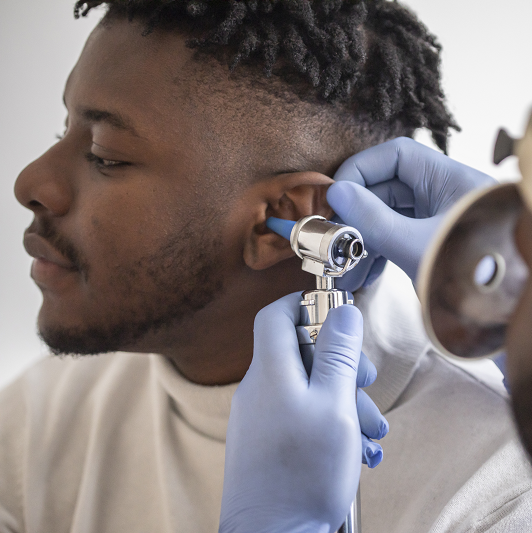5 Ways to Prevent Hearing Loss Caused by Headphones

February 25, 2021
Headphone use has grown exponentially in the past decade. It’s hard to walk down the street without seeing those well-known white earbuds. With so many people working from home during the COVID-19 pandemic, headphone use has become a daily occurrence.
While headphones can be incredibly convenient, they can also cause noise-induced hearing loss. In the U.S., and estimated 48 million people have hearing loss in at least one ear, according to the Centers for Disease Control and Prevention (CDC). The problem is particularly worrisome among young people—nearly 50 percent of those ages 12 to 35 could be exposed to unsafe noise levels from their devices.
It’s not practical for most of us to eliminate headphone use altogether. However, there are a handful of things you can do to use them more safely. Virginia-Gural Toth, AuD, CCC-A, manager of the Audiology, Tinnitus and Balance Programs at the Center for Audiology at JFK Johnson Rehabilitation Institute, offers these five tips:
- Use headphones, not earbuds. Although headphones can be cumbersome, they’re much safer than earbuds. “Earbuds are worse,” Gural-Toth says. “If you think about it, you’re getting that earbud deeper into the ear canal, increasing the sound pressure level and subsequently increasing the volume of the sound.”
- Lower your volume. When a personal listening device is at its maximum volume level, hearing loss can occur in less than five minutes, according to the CDC. When using headphones, it’s important to be aware of how loud your audio is. The CDC recommends listening for no more than two hours at a volume no more the half the range available in the device.
- Limit your time. Noise-induced hearing loss doesn’t just occur from a high volume—it can also happen if you use your headphones for a prolonged period of time. “What people don’t understand is that it’s not just the loudness of what they’re listening to but the duration of time they are listening to that can cause damage,” Gural-Toth says. Try to limit your headphone use to less than two hours at a time.
- Pay attention to those around you. Having trouble discerning whether your music is too loud? Gural-Toth says a good rule of thumb is, if someone next to you can hear music coming out of your headphones, it’s too loud.
- Invest in noise-cancelling headphones. Gural-Toth says noise-induced hearing loss can occur when you’re in a loud environment and you’re using music to cover up the noise. This is especially true when you are working out at a fitness center. “You start to make the volume of your headset louder to overcome the volume on the treadmill,” she says. Noise-cancelling headphones eliminate outside noise so you won’t have to turn your volume quite as high.
The material provided through HealthU is intended to be used as general information only and should not replace the advice of your physician. Always consult your physician for individual care.
Find a doctor near me
Advice for Buying Hearing Aids

Get expert hearing aid advice. Avoid online risks; schedule a hearing assessment with an audiologist at JFK Johnson Rehabilitation Institute for personalized care and optimal hearing health.
What Are the 3 Types of Hearing Loss?

Understand the 3 types of hearing loss. Learn about sensorineural, conductive, and mixed hearing loss from Dr. Gural-Toth. Schedule an appointment today.
